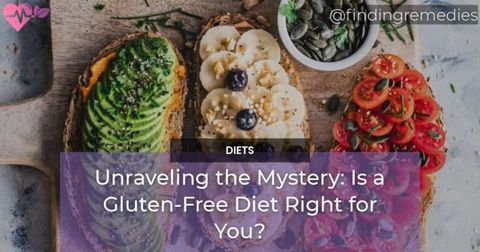Gluten-free diets have become increasingly popular in recent years, but their suitability for everyone still remains a mystery. For some, a gluten-free diet is a necessity due to celiac disease or gluten sensitivity, while others adopt the diet as a lifestyle choice for its perceived health benefits. Regardless of the reason, it’s important to understand the key components of a gluten-free diet, its potential benefits and risks, and how to follow it successfully.
Table of Contents
Key components
What Is Gluten?
Gluten is a protein found in wheat, barley, and rye which gives dough its elasticity and provides structure to baked goods. Gluten is also found in a variety of other processed foods, such as pasta, cereals, and sauces. For individuals with celiac disease or gluten sensitivity, consuming gluten can trigger an immune response, leading to inflammation and damage to the small intestine.
Foods to Avoid on A Gluten-Free Diet
On a gluten-free diet, it’s essential to avoid all sources of gluten. This includes obvious sources such as bread, pasta, and cereal, as well as less obvious sources such as soy sauce, beer, and even some medications. It’s important to read labels carefully and look for gluten-free certifications on packaged foods.
Gluten-Free Alternatives
Thankfully, there are many gluten-free alternatives available for those following the diet. These include grains such as rice, quinoa, and corn, as well as gluten-free flours made from nuts or seeds. It’s also possible to find gluten-free versions of many processed foods, such as crackers and cookies.
Nutrient Requirements
Potential Nutrient Deficiencies
A gluten-free diet can lead to nutrient deficiencies if not followed properly. This is because many gluten-free products are not fortified with essential vitamins and minerals, and gluten-free diets may limit the intake of certain grains which are good sources of nutrients like iron and fiber. It’s important to ensure that a gluten-free diet includes a variety of nutrient-dense foods.
Sources of Gluten-Free Nutrients
There are many nutrient-dense foods that are naturally gluten-free, such as fruits, vegetables, and lean proteins. It’s also possible to find gluten-free whole grains such as quinoa and buckwheat, which are rich in fiber and other essential nutrients. Supplements may be necessary for individuals who are unable to meet their nutrient needs through food alone.
Supplementation Considerations
Supplements can be a valuable addition to a gluten-free diet, but it’s important to choose high-quality products from reputable brands. Supplements should be chosen based on individual nutrient needs, and it’s important to consult with a healthcare professional before starting any new supplements.
Health benefits
Celiac Disease Management
For individuals with celiac disease, a gluten-free diet is the only effective treatment. Eliminating gluten from the diet can help to reduce inflammation and damage in the small intestine, and may lead to improved absorption of nutrients.
Non-Celiac Gluten Sensitivity
Non-celiac gluten sensitivity is a condition in which individuals experience symptoms similar to those with celiac disease, but without the characteristic damage to the small intestine. For these individuals, a gluten-free diet may help to alleviate symptoms such as abdominal pain and bloating.
Improved Digestion
Many individuals report improved digestion and reduced gastrointestinal symptoms when following a gluten-free diet. This may be due to the elimination of processed foods and the inclusion of nutrient-dense whole foods.
Scientific evidence
Research on Celiac Disease and Gluten Intolerance
Research has consistently shown that a gluten-free diet is the most effective treatment for individuals with celiac disease or gluten intolerance. A study published in the journal Gastroenterology found that a gluten-free diet led to significant improvements in intestinal damage and symptoms in individuals with celiac disease.
Studies on Gluten-Free Diets and Health Outcomes
Research on the health benefits of a gluten-free diet is still emerging, but some studies suggest that it may help to reduce inflammation and improve overall health. A study published in the Journal of Medicinal Food found that a gluten-free diet led to significant reductions in markers of inflammation in healthy individuals.
Critiques of Gluten-Free Diets
Some experts argue that a gluten-free diet is unnecessary for individuals without celiac disease or gluten sensitivity and that it may actually be harmful due to the potential for nutrient deficiencies and the inclusion of processed gluten-free foods.
Tips for Success
Reading Labels and Ingredient Lists
- Look for gluten-free certifications on packaged foods
- Avoid products that contain wheat, barley, or rye
- Watch out for hidden sources of gluten, such as soy sauce and beer
Cooking and Eating out On a Gluten-Free Diet
- Choose naturally gluten-free whole foods, such as fruits, vegetables, and lean proteins
- Experiment with gluten-free grains such as quinoa and rice
- Ask questions and communicate with restaurant staff to ensure that meals are gluten-free
Building a Balanced Gluten-Free Meal Plan
- Incorporate a variety of nutrient-dense whole foods
- Include lean proteins and healthy fats in every meal
- Choose gluten-free whole grains for added fiber and nutrient benefits
Risks and Precautions
Processed Gluten-Free Foods
Many packaged gluten-free foods are highly processed and may be low in nutrients. It’s important to read labels carefully and choose products that are made with whole food ingredients.
Cross-Contamination Risks
Cross-contamination can occur when gluten-free foods come into contact with gluten-containing foods during preparation or cooking. It’s important to take precautions to prevent cross-contamination, such as using separate utensils and cooking surfaces for gluten-free foods.
Negative Effects on Gut Health
Some experts argue that a gluten-free diet may have negative effects on gut health due to the elimination of beneficial fiber and prebiotics. It’s important to include a variety of nutrient-dense whole foods to ensure optimal gut health.
Conclusion
A gluten-free diet can offer significant benefits for individuals with celiac disease or gluten sensitivity, as well as potentially improving overall health and digestion for others. It’s important to understand the key components of a gluten-free diet, how to ensure proper nutrient intake, and how to follow the diet successfully while minimizing risks.

